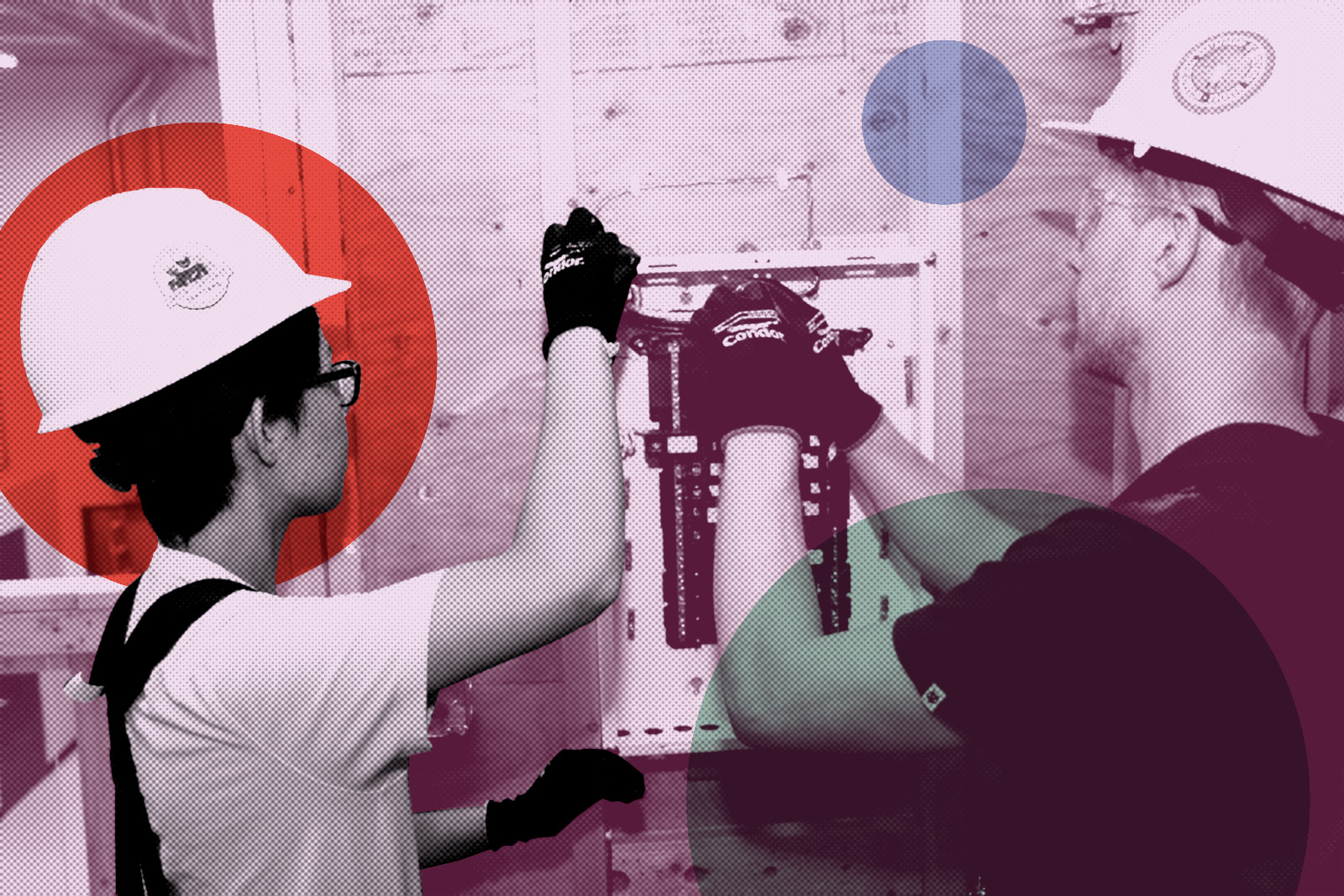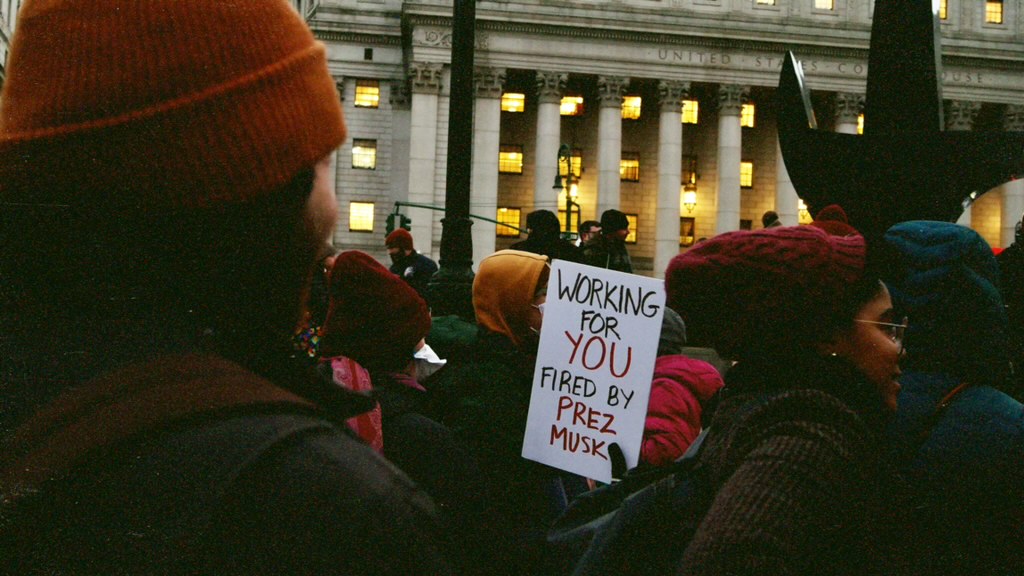I wish I could tell you that quitting my job as a software engineer was some part of a grand personal strategy. In reality, I just couldn’t cut it as a software engineer in an office setting. The crunch-time deadlines and the constant pressure to take my work home with me were exhausting. After a few months of trying and failing to get a new salaried position at a company, any company, I was faced with the reality that I wouldn’t be able to afford rent in a few months.
Instead I chose to change careers and join the International Brotherhood of Electrical Workers (IBEW). It’s been a year now, and I can say firmly that I’ve made the right choice.
Why IBEW?
There are a lot of challenges for socialists in the building trades. After years of business-friendly leadership, it’s hard to find any construction union that is willing to actually throw down against the contractors. IBEW even has the Council of Industrial Relations, a body of half union reps and half contractors, whose entire purpose is to mediate contract disputes and avoid strikes. Another obstacle to militancy on the job is the craft setup in construction: at any one time there can be half a dozen different unions working on the same jobsite. This can make it easy to pit workers against one another, something that was recently brought to light in Boston when IBEW crossed a Painters Union picket line. The legacy of the conservative American Federation of Labor looms large over the building trades, especially when compared to the industrial setup of Congress of Industrial Organizations descendants like the United Auto Workers and the Teamsters, who once fought their union bureaucracies to organize along industrial lines. While the latter unions have long-lost memories of political radicalism, the building trades are starting from a militant but politically conservative base.
In the past, Austin DSA’s labor work had focused on the unorganized. As labor co-chair, I mostly had been taking calls from disgruntled employees who showed up to organizing committee meetings. While this is all well and good, the leads can be slow to generate and can easily fizzle off if a single worker decides to act too soon or leaves their job.
The more I thought about it, the more getting a union job seemed like a good way to have consistent labor work going on in Austin. Despite all the disadvantages described above, I decided that IBEW was strategic for Austin DSA. The first was that the leadership of Local 520, while not explicitly socialist, is a left-wing leadership swept in on a tide of revulsion to business-as-usual. Local 520 has been eager coalition partners with DSA on issues such as getting all workers in Austin paid sick leave, and the local supported our runs for office, most notably Heidi Sloan’s 2020 congressional campaign. This unusually friendly terrain is enhanced by the fact that we already had several DSA members in the union. Some of the best advice I ever got was that you should never try to organize alone, and without other DSA members in the union I would have lost heart months ago.
Because of the right-wing terrain in the South, there is an understandable desire for socialists to “moderate our message” to win office or to hope that mutual aid projects will be more effective than labor organizing. The reality is that for socialism, there is no way but through. Strengthening our unions through activity of the rank and file is an indispensable part of ending the right-wing domination of our states. Without the resources our unions command, new union drives cannot get off the ground. Without an organized working class, socialism can never achieve its aims. In Texas, our goals are exactly the same as they are in New York or Chicago. We are simply starting from a different point of working-class organization in Texas.
This can have its advantages and disadvantages. Where socialists will not find historically strong unions, they can find unions that are much easier to get active in simply because of the need for more hands. Mobilizing these unions to organize more aggressively in their industry is first and foremost the way the labor movement can reach unorganized workers, and in the South there’s nowhere to go but up.
The Life of an Electrician
As far as socialist agitation goes, conversations on the job are easier than you’d expect. Everyone has some reason why they became union. They got fired for bringing their wife to a Christmas party, or they got tired of being promised promotions at a warehouse only for that promotion never to come. What you hardly ever need to do on a jobsite that’s already union is convince your coworkers that the union should stand for their best interests, even in Texas. Issues on the job site are ones that only the union can address. There are no illusions that if you ask nicely maybe your manager will give you paid time off. Instead, most people wonder how we can get PTO through our next contract.
This is why it’s important for socialists to be on the shop floor. It’s very easy for union members to get angry at “the hall” for not taking action on issues they feel are important. As socialists, we believe a union is only strong when it’s member-run, so it’s easy to steer those conversations in the direction of action instead of resentment. That’s something that people can learn, but they need trust to begin to learn: the kind of trust that you can only earn through working together on the job.
I won’t lie to you: being a construction worker is hard work. I’ve spent more days than I can count on the business end of a shovel in a ditch. But, like all work, there are good days and bad days. Being an electrician allows you to take tremendous pride in your work. Making conduit runs look pretty is a work of determination, wit, and spatial reasoning. Getting a panel wired up neatly is a testament to your attention to detail and your dexterity. Something that surprised me going from being an office worker to a construction worker was just how willing people were to help me get up to speed. Every person in the union was green at one point, and the most core, inalienable belief for every brother and sister in the IBEW is that a crew is only as strong as its weakest link.
Should you choose to become an electrician, you’ll find all sorts of canny ways to get the job done quickly and efficiently from your more experienced brothers and sisters, and the sense of camaraderie that you get from perfecting a day’s work is equal to nothing I’ve experienced on a job before.




